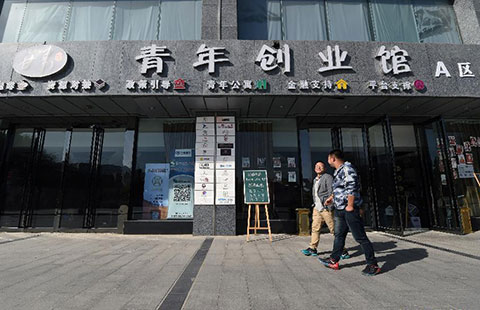Rare earth major cuts production
By LYU CHANG (China Daily) Updated: 2015-10-14 07:06Oversupply and illegal mining force company to scale down annual output target for 2015
China Northern Rare Earth (Group) High-tech Co Ltd said on Tuesday that it was effecting a 10 percent reduction in its rare earth output target, as prices have fallen sharply due to oversupply and illegal mining.
The company, China's largest rare earth miner, said its reduced rare earth output for this year would be 2,596 metric tons. The move, the company said, will "help stabilize the market and prop up prices of rare earth products".
An informed source told China Daily that the company was asked by the government to cut its output target in September, after prices fell more than expected, and many rare earth mining firms slipped into the red.
"The other five major rare earth miners will also roll out measures to cut their output targets for this year," the source said. "We hope this will bring normalcy to the industry and relieve the pressures caused by a glut in the market."
Operating revenue of the company rose 35 percent to 3.2 billion yuan ($502 million) for the first half of this year, but its profit was only 260 million yuan, up a mere 2 percent for the same period.
The average prices of neodymium iron boron permanent magnets made out of rare earths and used in strategic industries such as smartphones, military and airplane equipment, have plummeted since 2011.
Prices fell to their lowest this year, as China decided to drop export quotas in January, and announced cancellation of rare earth export tariffs in April, in a bid to curtail smuggling.
Meanwhile, the sharp drop in prices has boosted overseas sales of rare earths, as foreign buyers are going on a shopping spree, taking advantage of low prices.
China, the world's largest rare earth supplier, exported 3,658 tons of rare earths in July, the highest level in four years, double the amount from a year earlier. However, the average prices have witnessed a drop of about 30 percent.
During the first three quarters of this year, about 23,400 tons of rare earths were exported to countries like the United States and Japan, data from the General Administration of Customs showed.
Chen Zhanheng, deputy secretary-general of the Association of China Rare Earth Industry, said that the curbs on production are expected to push up prices in the short term. However, technology will be the key to solving the problems faced by the rare earth industry in the long term.
"Companies will have to shift to downstream business to absorb the excess production," Chen said.
The Ministry of Industry and Information Technology announced the first batch of rare earth production quotas in 2015. This includes a quotas of 52,500 tons for rare earth mining and another 50,050 tons of rare earths smelting and separating production quotas.
- Inner Mongolia reports rare earth export growth in first eight months
- More efforts being made to upgrade rare earth production
- Rare earth mining firms slip into the red
- Turnover of China's rare earth exchange surges in first 7 months
- Rare earth mining firms slip into the red
- China vows continued crackdown on illegal rare earth mining
- Job market faces fierce competition in Q3, report says
- Top 10 most valuable privately held Chinese brands
- Copyright transfer a major step forward for China's music industry
- City of London expects Xi's visit to boost Chinese-British financial cooperation
- China's push to add renminbi to SDR basket nearing finish line
- Sept export fall less than expected, imports slump
- Nordic startups to benefit from Sino-Finnish fund
- Cheap medicines disappear from market
















